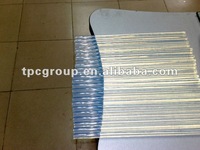- Metal Crafts[5]
- Carpet[10]
- Beach Chairs[10]
- Cooking Tool Sets[1]
- Cookware Sets[5]
- Hangers & Racks[3]
- Candy[10]
- Jackets[7]
- OEM Service[4]
- Stickers[5]
- Paper & Paperboard Printing[5]
- Packaging Boxes[1]
- Windmill[10]
- Auto Ignition System[2]
- Strollers[10]
- Christmas Decoration Supplies[2]
- Dishes & Plates[10]
- Mugs[10]
- Evening Bags[9]
- Fashion Accessories Design Services[2]
- Glass[10]
- Hot Melt Glue Sticks[7]
- Other Chemicals[4]
- Nitrate[1]
- PVC[1]
- Pendants & Charms[1]
- Bracelets & Bangles[1]
- Stone Crafts[1]
- Pottery & Enamel[1]
- Painting & Calligraphy[1]
- Contact Person : Mr. Li Dankle
- Company Name : Beijing Dakaile Import & Export Trading Co., Ltd.
- Tel : 86-10-84786263
- Fax : 86-10-84786263
- Address : Beijing,Beijing,Room 2709, Floor 23, Building 401, Wangjing Yuan, Chaoyang District
- Country/Region : China
hOT MELT GLUE STICKS
Hot melt adhesive (HMA), also known as hot glue, is a form of thermoplastic adhesive that is commonly supplied in solid cylindrical sticks of various diameters, designed to be melted in an electric hot glue gun. The gun uses a continuous-duty heating element to melt the plastic glue, which may be pushed through the gun by a mechanical trigger mechanism, or directly by the user. The glue squeezed out of the heated nozzle is initially hot enough to burn and blister skin. The glue is tacky when hot, and solidifies in a few seconds to one minute. Hot melt adhesives can also be applied by dipping or spraying.
In industrial use, hot melt adhesives provide several advantages over solvent-based adhesives. Volatile organic compounds are reduced or eliminated, and the drying or curing step is eliminated. Hot melt adhesives have long shelf life and usually can be disposed of without special precautions. Some of the disadvantages involve thermal load of the substrate, limiting use to substrates not sensitive to higher temperatures, and loss of bond strength at higher temperatures, up to complete melting of the adhesive. This can be reduced by using a reactive adhesive that after solidifying undergoes further curing e.g. by moisture (e.g. reactive urethanes and silicones), or is cured by ultraviolet radiation. Some HMAs may not be resistant to chemical attacks and weathering. HMAs do not lose thickness during solidifying; solvent-based adhesives may lose up to 50-70% of layer thickness during drying
hOT MELT GLUE STICKS







